CAPS Mathematics in the Classroom
Reflection on the implementation of CAPS Mathematics in the Classroom
by
WA Olivier
(ACM: Advisory Committee for Mathematics)
1. Introduction:
CAPS Mathematics represents an amendment to the National Curriculum Statement (NCS) for Mathematics in Grades R-12 and aims to provide more comprehensive support and detailed information on what content teachers ought to teach and assess on a grade-by-grade and subject–by-subject basis. Curriculum information also includes a clear delineation of topics for Mathematics and a recommendation on the number and type of assessments per term (DoBE, (2011)).
The Department of Basic Education has embarked on a five year plan (starting in 2011) to support Mathematics teachers during the implementation phases of the new curriculum.
For all relevant school subjects the following schedule for the implementation of the CAPS Mathematics curriculum was adopted:
- 2012 Implementation in Grades R – 3 and Grade 10
- 2013 Implementation in Grades 4 – 9 and Grade 11
- 2014 Implementation in Grade 12.
Preparations for the above phases of the CAPS implementation saw a plethora of activities being introduced since 2011. In a recent report (Olivier; 2013) that was submitted to SAMF, the outcomes of some of the CAPS Mathematics training activities at national and provincial levels were discussed against the background of growing concerns that the preparations of teachers to cope with the additional demands of the CAPS curriculum were not always adequately addressed.
2. Aim of Report:
The aim of this follow-up report is to reflect and interpret the views of a cohort of in- service Mathematics teachers on various aspects of the implementation of the CAPS curriculum in the school classroom. Both content-specific and more general aspects of implementing the new CAPS Mathematics curriculum in the classroom were targeted. An attempt is made in this report to reflect the general state of readiness of teachers in under-resourced schools to teach the CAPS Mathematics curriculum and to identify some of the main challenges that are currently experienced by such teachers in the Mathematics classrooms.
3. Data collection:
A structured survey was done amongst just more than one hundred in-service FET Mathematics teachers representing schools from eight education districts in the Eastern Cape province of SA. Respondents are all teaching in government schools (excluding ex-model C) and the school sample was fairly evenly spread across urban, rural and deep-rural regions of the province. The survey consisted mostly of a combination of Likert items and open-ended questions. Basic Likert scales were used to represent data graphically in order to visualize common trends amongst responses.
4. Findings:
On general aspects of implementing the CAPS Mathematics curriculum:
The majority of respondents (>70%) were in agreement that the available teaching and learning material is of good quality and that textbooks were delivered on time at the start of the 2014 academic school year. Less than 10% of respondents thought that the degree of difficulty of the CAPS Maths content material was unreasonable. About 50% of respondents have indicated that they were not able to complete the curriculum in time in 2013. This response may be linked to a more significant statistic about the time that was spent on teaching content that was supposed to be part of pre-knowledge for a particular grade level. More than 90% of respondents have reported that they have spent a considerable amount of time in the classroom to re- teach/revise content from previous years to assist learners.
On the status of teachers:
The majority (>60%) of teachers who participated in the survey felt that the official CAPS training that was offered by the DoBE prepared them adequately. Although more than 65% of respondents indicated that they feel confident to teach the CAPS curriculum in the classroom, this Likert scale is in contrast with responses to two separate but equivalent Likert items which tested the need amongst teachers for more CAPS related content training. In both instances more than 90% of respondents strongly disagreed with the statement that teachers do not need more CAPS Mathematics content training.
On the status of learners:
A significant percentage (>45%) of respondents indicated that learners did not cope academically with the CAPS Mathematics curriculum. The lack of additional Mathematics support materials for learners at schools is a survey outcome to be noted. Only 30% of respondents have indicated that learners had access to some school-based scaffolding support in the form of additional textbooks or similar material. Another telling trend that has emerged from the survey is the belief amongst more than 60% of respondents that learners would normally not progress to the next grade level based on the Mathematics exam mark only. This statistic seems to be aligned with the rating by respondents (see below) of learner attitudes & mathematical skills as major challenges during the implementation of the CAPS Mathematics curriculum in classrooms.
On classroom challenges experienced by teachers when teaching Mathematics:
The following graphical representations of Likert scales linked to survey items profile some of the challenges that respondents have experienced in the Mathematics classrooms over the past academic year.
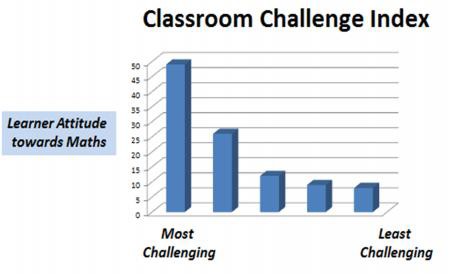 |
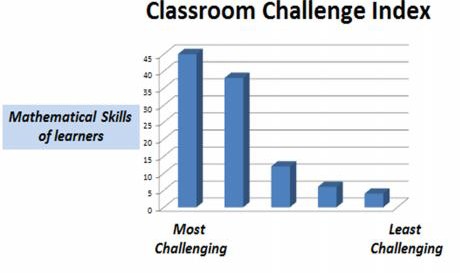 |
|
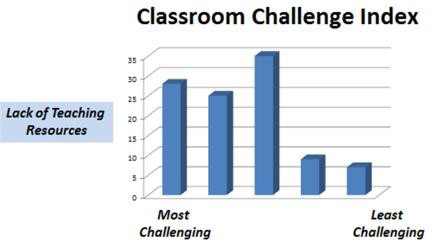 |
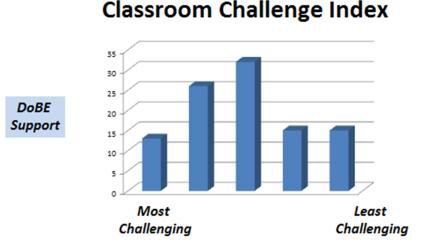 |
|
| Figure set 1. | ||
On classroom challenges experienced by teachers when teaching Mathematics:
Respondents have indicated, without exception, that they are in dire need of further professional development. A number of possible professional skills development types were presented to respondents as Likert items with the request to prioritize each in terms of their personal needs.
The following Graphic representations reflect the responses:
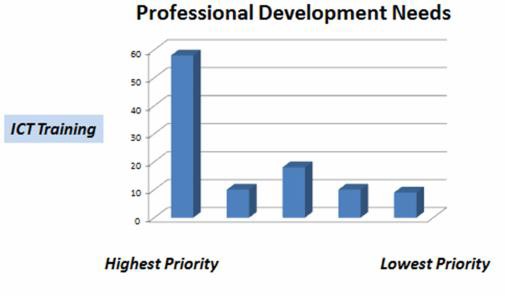 |
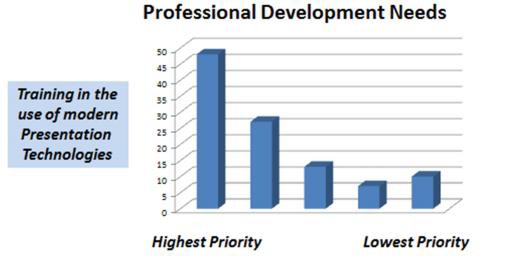 |
|
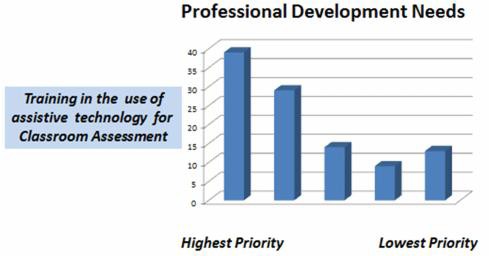 |
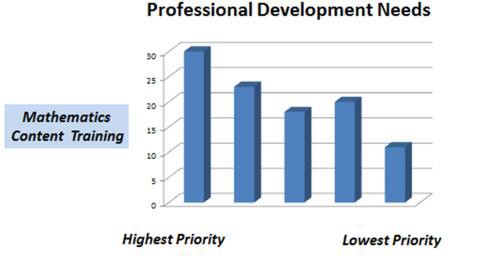 |
|
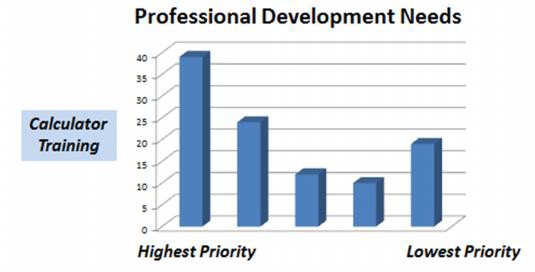 |
||
| Figure set 2. | ||
On the content areas of the CAPS Mathematics curriculum:
In order to establish the Mathematics content areas that teachers found most (least) challenging to teach, the respondents were presented with the ten content topic areas as reflected in the official CAPS curriculum document. Respondents had to select topics that they are least (most) comfortable with to teach. The accumulative responses are summarized by topic in the table below:
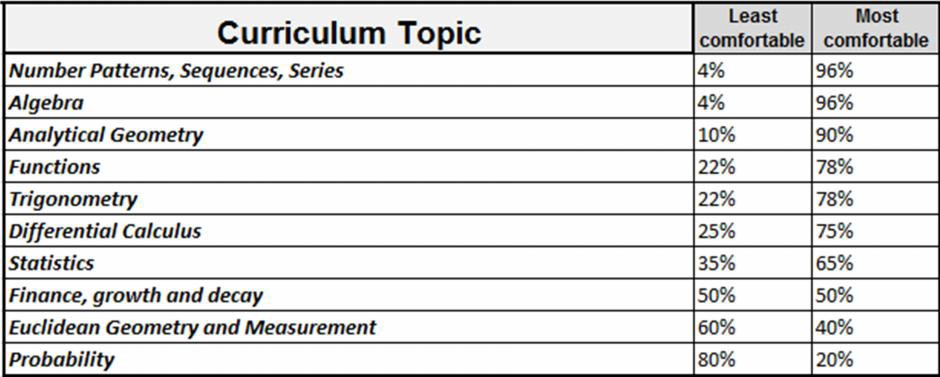 |
| Table 1. |
The ranking of Financial Mathematics amongst the most challenging topics to teach in the classroom was somewhat of a surprise. Noteworthy amongst the responses linked to this item is the reference to language as a contributing factor to the status of this topic as one that is least comfortable to teach.
“In Financial Maths learners are challenged by language.”
Most of the teacher responses (55%) in the open question section of the survey reflected the need for more content specific training:
“I did not have enough workshops in Financial Maths and never did Probability and Geometry. I am trying although it's hard.”
Other response types that were noticeable in the data from the survey included references to lack of teaching and learning resources (about 20% of responses) and the lack of basic teaching equipment/ technologies (about 15% of responses) to assist with the teaching of CAPS Mathematics in the classroom (scientific calculators were mentioned specifically).
“Most of my learners do not have textbooks, so they are not understanding the content.”
“It is not easy coping with shortage of resources.”
“More materials for learners should be made available.”
“Hand-out/Notes in specific topics. Need calculators for learners and assistance on how to apply.”
“If only we can be provided with the modern technology to assist us in the teaching of mathematics.”
5. Conclusions:
Evidence seems to suggest that most of the challenges that have existed in Mathematics classrooms before the introduction of the CAPS curriculum are still present. These challenges were widely reported on in the media and, inter alia, included school management, socio economic factors and other non-academic areas of concern (Taylor, N., & Taylor, S., (2013)). Some of the key educational factors that are also well known to have contributed to the crisis in Mathematics education over many years are the lack of content knowledge of in-service teachers, learner attitude towards Mathematics and the Mathematical skills deficit of learners as they progress through the school phases (see for instance Spaull, (2013) and NGOPULSE, (2013)). These limiting factors together with the lack of quality resource material support for learners have again emerged from the teacher survey that was conducted as some of the major challenges that were experienced by teachers during the implementation of the CAPS Mathematics curriculum in school classrooms.
Survey feedback from respondents also clearly showed that the CAPS curriculum has introduced additional pressures on in-service teachers to cope with the teaching of Mathematics. It is noticeable that Probability Theory, Euclidean Geometry and Financial Mathematic are amongst the compulsory CAPS syllabus topics that were identified by teachers as most challenging to teach.
The sad reality in South Africa is that neither universities nor any other formal education service providers have ever managed to create a Mathematics in-service training program that has been rigorously evaluated and proven to effectively raise teacher content knowledge. In fact, no generic professional skills development program for in-service Mathematics teachers has ever existed in this country. This, despite many attempts by government and other academic stakeholders to draft and implement grandiose professional development programs. For example, very little if anything of what is stated in the Integrated Strategic Planning Framework for Teacher Education and Development in South Africa 2011–2025 (DoBE, 2010) has been realised in practise.
(DoBE, (2010) - Pg. 79)
“The overall goal is to set up a comprehensive long-term system that would provide accessible opportunities for practising teachers, both individually and collectively via their participation in Professional Learning Communities (PLCs), to assess their curriculum knowledge, competence and professional practice, in order to identify their development needs related to their specific teaching specialisation and other identified priorities that would be targeted over time.”
6. Recommendations:
Development and Support of in-service Mathematics teachers
An urgent need exists to implement structured support and focused professional skills development programs for in-service Mathematics teachers to address some of the current CAPS Mathematics curriculum implementation challenges in the classroom.
In particular, the following steps are recommended:
- Identify the CAPS-specific content gaps of individual teachers by means of standardized diagnostic tests;
- Identify individual lead teachers on a district basis who have sufficiently high levels of content knowledge and proven excellent practising skills;
- Train lead teachers and subject advisors in districts to act as mentors for those teachers who need additional CAPS content training and support;
- Encourage and incentivise district-based communities of practise and activities where lead teachers can play a professional development and/or mentoring role.
- Establish scaffolding support platforms (at provincial or at district level) for Mathematics teachers that will provide flexible and user-friendly access to quality content-rich CAPS T&L resource material.
- Identify dedicated professional development time as part of the academic school calendar each year with the aim of strengthening the knowledge and professional skills of in-service Mathematics teachers.
Learner access to quality resource material in schools
There is a the growing demand amongst learners for effective scaffolding support in the form of quality learning material that is more user-friendly and accessible. The reported lack of quality T&L resources (or learner access to T&L resources) raises a red flag which represents a potentially devastating consequence for the intended outcomes of the implemented CAPS curriculum in schools.
The negative perception amongst teachers of the attitude of learners towards Mathematics seems to also be directly linked to the academic profile of learners that they have to teach. The fact that most teachers reported that they have to spend a significant amount of classroom time teaching curriculum topics at a lower grade level in order to facilitate meaningful learning poses a serious threat to the anticipated outcomes of the intended curriculum.
- Dedicated learning environment(s) should be earmarked at every school where learners can access quality CAPS aligned resource material which also allows for curriculum-aligned scaffolding support at grades lower than the present grade that a learner is in.
Learner progress based on final assessment in each grade
The perception amongst most teachers that learners will not progress based on the formal summative assessment alone is alarming and points to the extent and deep- rooted nature of the content deficit of learners. This clearly confirms that learner progress to the next grade level may in many cases be artificial and eventually could lead to an academic dead-end and disappointment.
Hence it is recommended that:
- Firm recommendations about continued presentation of CAPS Mathematics at the next grade level should be communicated to learners who have passed Mathematics only because of the relative weight of the school based assessment (SBA) mark i.e. with final exam mark below 30%. Note that the final examination mark currently counts 60% towards the final promotion mark.
To have good Mathematics teachers in the school classroom should be the central focus during the journey towards restoring Mathematics education in our country.
Only then will learners be more motivated, more engaged to do Mathematics, more aware of the beauty and value of Mathematics as a subject with the potential to secure economic liberation.
Bibliography:
Department of Basic Education (DoBE) (2010). Integrated Strategic Planning Framework for Teacher Education and Development in South Africa 2011–2025. Technical Report, Available from http://www.education.gov.za/LinkClick.aspx?fileticket=lXfDtQxRz3M%3D& (accessed May 2013)
Department of Basic Education (DoBE) (2011). Curriculum News. Improving the quality of learning and teaching. Strengthening Curriculum implementation from 2010 and beyond, Available from http://www.education.gov.za/LinkClick.aspx?fileticket=RlQ3WgihTOA%3D (accessed May 2013)
NGOPULSE (2013). Education in SA: Where did it go wrong, http://www.ngopulse.org/article/education-south-africa-where-did-it-go-wrong (accessed April 2014)
Olivier, W.A., (2013). Reflection on the training of teachers for the CAPS mathematics curriculum – a brief report, ACM report on behalf of SAMF. http://www.samf.ac.za/caps-mathematics-report (accessed April 2014)
Taylor, N., & Taylor, S. (2013). Teacher knowledge and professional habitus. In N. Taylor, S. Van der Berg, & T. Mabogoane, What makes schools effective? Report of the National Schools Effectiveness Study (pp. 202-232). Cape Town: Pearson Education, South Africa.
Spaull, N. (2013). Teachers can’t teach what they don’t know: On one key factor behind the academic bankruptcy of many SA schools, Politicsweb, http://www.politicsweb.co.za/politicsweb/view/politicsweb/en/page71619?oid=399970&sn=Detail (accessed April 2014).
